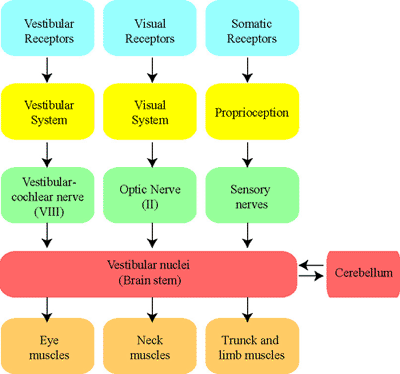D. Integration of the Vestibular system with other systems in the body:
|
|
1. Three systems are involved in our balance: a. the vestibular system b. the visual system c. the musculo-skeletal system (=proprioception)
|
2. Proprioception: This is the system that informs the brain of our "position" in space. Sensors are located in the joints (to measure the angle), in the skeletal muscles (to measure their length) and especially in the neck (to determine the relation of the head to the rest of the body).
|
3. Vestibular nuclei: All this information is fed into the vestibular nuclei for processing. In addition, there is a close relation between these nuclei and the cerebellum (=auto pilot). |
4. Effectors: From the vestibular nuclei, commands are given to the eye muscles, the trunc, the limb and the neck muscles to either keep the shape of the body or to change it according to demand. The role of the neck is very visible in animals with long necks such as horses and camels. The animal can rotate its neck to look, for example, behind itself. When the animal then wants to move in that direction, then the body, as it where, "follows" the neck.
|
5. When are we in balance? We are in balance when the information from the three systems agree with each other. For example, suppose that you are in an elevator which looks outside (as in some expensive hotels) and you go up in that elevator. Then your eyes tell you that you are going up, your sacule feels that you are going up and the pressure sensors in your musculo-skeletal system informs the brain that the body is moving upwards. |
6. Motion sickness But if there is a conflict between the information received from one (or two) of the three systems, then we become violently sick: motion sickness. This is well known when one is on a boat in a choppy sea. Another current example is trying to read a book while riding in a car. Your eyes concentrate on the reading (stable) while your vestibular system and your proprioception inform you that you are constantly accelerating and decelerating. Good reason to become very very sick. |
5. Symptoms: The symptoms of motion sickness are quite severe:
|
6. Why so severe? Body position is crucial fo survival. The brain needs to know all the time the EXACT position of the head, the limbs etc. It must be able to act immediately in the case of danger. If there is a conflict in the information it is receiving, it can then no longer react adequately to danger. Whatever causes this mis-information must STOP immediately. Hence, motion sickness is really incapacitating. |
